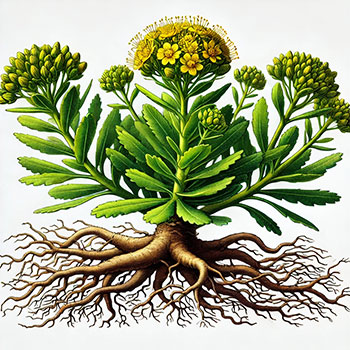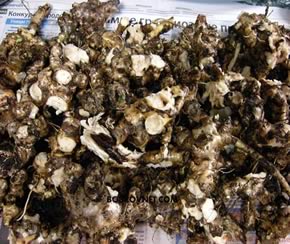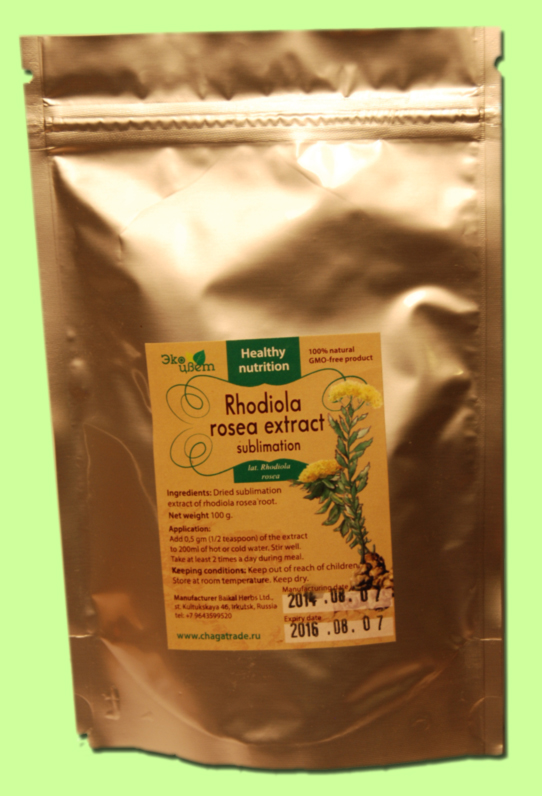RHODIOLA ROSEA EXTRACT
Rhodiola rosea (also known as Golden Root, Roseroot and Arctic root) is a perennial that grows in the wild in the mountains of Siberia, Central Europe and North America. The plant is found only in a severe alpine climate and grows very slow. Its underground parts (rhizomes with roots) are used as medicinal raw material. Due to its slow growing pattern it can take up to a decade before the raw roots are suitable for medicinal use. The plant has been categorized as an adaptogen by Russian researchers in the early 50s due to its reported ability to increase resistance and support the adaptation of the body and its inner workings to a variety of chemical, biological, and physical stressors.
How to order Rhodiola extract from Siberia
The minimum order quantity for our Rhodiola extract is 1kg (10 x 100g bags). However, the minimum order refers to the total weight of products ordered on chagatrade.com, not just a single product. For instance, you can combine products like 2 bags of Leusea extract, 2 bags of Rhodiola extract, and 6 bags of Chaga extract, or any other mix of products. If you'd like to place a combined order, feel free to contact us, and we’ll calculate the total amount for you.
Price includes delivery by DHL international express courier.
Recommended daily use: Dissolve 0.5g (or less) of the powder in 200ml of water. Drink twice a day, or take before intense physical activity or a sporting event (for athletes)
|
 |
Information about Rhodiola Rosea

Roseroot, or Rhodiola rosea, has long been revered in traditional medicine across Russia and Asia. Folk remedies relied on it to boost physical stamina, enhance productivity, promote longevity, combat altitude sickness, and address conditions like fatigue, depression, anemia, impotence, gastrointestinal issues, infections, and nervous system disorders. In certain mountain communities of Siberia, it remains customary to gift a bouquet of roseroot to newlyweds as a fertility charm, believed to promote the birth of healthy children. In Central Asia, Rhodiola tea was a trusted remedy for colds and flu during harsh winters, while Mongolian healers prescribed it for tuberculosis and cancer. For centuries, the locations of wild “golden roots” and the techniques for their extraction were closely guarded family secrets. These roots were covertly transported along ancient trade routes from Siberia to the Caucasus, where they were bartered for Georgian wines, fruits, garlic, and honey. Even Chinese emperors dispatched expeditions to Siberia to procure the prized ‘Golden root’ for medicinal purposes.
Rhodiola continues to play a significant role in traditional medicine across Eastern Europe and Asia, where its reputation for stimulating the nervous system, alleviating depression, improving productivity, enhancing sleep, combating fatigue, sharpening cognitive abilities, and preventing stress-related cardiac issues remains strong. The roots contain active compounds that have demonstrated anti-fatigue, anti-inflammatory, liver-protective, and anti-tumor properties.
Since the 1950s, clinical studies have validated Rhodiola's health benefits, proving its efficacy in treating nervous exhaustion, chronic fatigue, various neuroses, anorexia, irritability, chronic headaches, insomnia, and attention deficit disorders. Today, Rhodiola is recognized as one of the most potent adaptogens, especially recommended for athletes, labor-intensive workers, recovering patients, and the elderly.
As scientific understanding of Rhodiola's pharmacological benefits has grown, so has its commercial appeal. However, the slow growth cycle of the plant, coupled with increasing demand from the herbal medicine industry, has led to the depletion of wild populations. In response, cultivation efforts have been initiated in Poland, Sweden, Finland, and parts of the former Soviet Union. However, achieving high-quality raw material from cultivated plants has proven challenging.
The quality of Rhodiola is heavily influenced by the climate and soil conditions where it is grown. For example, plants grown in central Poland tend to have heavier roots, but these roots contain lower levels of rosavin and salidroside, the key active components, compared to those grown in southern Poland's mountainous regions. Additionally, post-harvest processing, such as stabilization and extraction methods, can significantly impact the quality of the final extract.
Research has demonstrated that plants grown at higher altitudes yield the highest concentrations of rosavin and salidroside. For instance, the salidroside content ranged from 125 mg to 1860 mg per 100 grams, depending on the altitude of the growing site. The best quality roots, containing the most potent active components, come from five-year-old plants grown at high elevations. Proper post-harvest treatment, such as drying the roots at room temperature (around 20°C) or at 80°C, is crucial to preserving the potency of the active compounds.
Today, Rhodiola extracts are available in various forms, including capsules and tablets. However, the dried raw roots from wild plants are still considered superior to the processed and standardized products found in most pharmacies.
Here is a rephrased and diversified version of the text:
Studies and Research
Extensive research into the effects of Rhodiola has been primarily conducted in Russia, beginning in the early 1950s. These efforts aimed to discover and harness natural "superfoods" that could provide the Russian population, particularly military personnel and Olympic athletes, with a competitive edge. Rhodiola extracts were even administered to Russian cosmonauts to help them withstand stress in extreme conditions. Some studies reportedly employed unorthodox or unethical approaches in order to yield rapid results.
Impact of Rhodiola on Cognitive Performance
The influence of Rhodiola on mental capacity was investigated through a proofreading test with healthy students. Participants completed a 5-minute proofreading task before and at 1, 2, 3, 4, 6, 8, and 24 hours after receiving either a Rhodiola preparation (10 drops of extract or 2.5 mg of salidroside) or a placebo.
One hour post-administration, the number of errors per 1,000 characters decreased by 56% in the Rhodiola group compared to the control group, and this improvement lasted for four hours. Although error rates eventually increased, they remained lower than in the placebo group. Additionally, the number of characters read was 5-7% higher among those who took Rhodiola.
The study concluded that a single dose of Rhodiola can significantly enhance mental performance, particularly by improving the quality of cognitive work. These findings align with results from studies on other adaptogens, such as Ginseng and Eleutherococcus (Siberian Ginseng).
Rhodiola’s Effect on Stress
Research demonstrates that Rhodiola can substantially reduce stress, leading to improved cognitive function. One study examined the effects of a low dose (170 mg/day) of Rhodiola on the fatigue and stress experienced by physicians working night shifts. This double-blind, crossover study assessed five cognitive functions: associative thinking, short-term memory, calculation, concentration, and audiovisual perception speed. After just two weeks of Rhodiola supplementation, the 56 young physicians showed significant improvements in mental performance, with no reported side effects.
Another trial at Volgograd Medical Academy assessed Rhodiola's impact during university exams. In this double-blind study, 60 foreign students were divided into experimental and placebo groups. Those who consumed 100 mg of Rhodiola extract daily for 20 days exhibited significant gains in physical endurance, coordination, and overall well-being. They also experienced less mental fatigue and anxiety, and their ability to learn Russian improved by 61% compared to the placebo group. Relative fatigue levels decreased by 30%, and the Rhodiola group scored higher on their final exams.
Rhodiola's stress-reducing benefits extend beyond cognitive stress. A study published in *Bioscience, Biotechnology, and Biochemistry* showed that Rhodiola protected rats from the adverse effects of noise-induced stress. While the placebo group displayed negative changes in their liver tissue when exposed to noise levels exceeding 95 decibels, the Rhodiola-treated rats showed no such damage.
A Unique Dual Action
One of the remarkable characteristics of Rhodiola is its ability to both calm and stimulate. Unlike most herbs or medications that have a singular effect, Rhodiola simultaneously relaxes the emotional system while energizing cognitive functions. For example, Valium may calm the brain but can also dull mental acuity. In contrast, Rhodiola helps alleviate stress, improving focus and concentration without diminishing cognitive performance. This dual action allows the mind to remain sharp and ready to perform at its best, even under pressure.
Download free report on Rhodiola Rosea made by Dr. Zakir Ramazanov called: Rhodiola Rosea - Russia's Best Kept Secret To Health & Longevity(PDF)
ORDER RHODIOLA EXTRACT NOW!
We offer freeze-dried Rhodiola extract derived from the roots of wild-grown Rhodiola plants. This extract contains high levels of rosavins and other adaptogenic compounds naturally found in Rhodiola roots. The extract is available as a water-soluble powder, packaged in 100g stand-up pouches.
